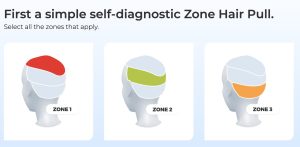
Are you worried about hair thinning or losing your hair? Biotin might offer a solution. This post will guide you on how biotin benefits your locks, from promoting growth to strengthening each strand.
Keep reading to discover how this nutrient can transform your mane.
Key Takeaways
- Biotin supports hair growth by boosting keratin production, which makes your hair stronger and fuller.
- Taking biotin supplements can help people who don’t get enough of this nutrient from their diet, especially if they are experiencing hair thinning or loss.
- Foods like eggs, salmon, and almonds are great sources of biotin and can naturally support healthy hair.
- Correcting a biotin deficiency with supplements or diet changes can improve the strength and health of your hair strands.
- Besides supporting healthy hair, biotin also helps keep your metabolism in check and boosts the overall health of skin and nails.
Understanding Biotin and Its Role

Moving from the basics, let’s focus on biotin and its significant role. Biotin, also known as vitamin H or vitamin B7, is a water-soluble nutrient that plays a vital part in our health.
It helps convert food into energy and supports enzymes that aid in the maintenance of hair, skin, and nails. For those struggling with hair loss, understanding biotin’s function could be key.
This vitamin doesn’t just float around; it gets right to work by stimulating keratin production, which builds up your hair.
Furthermore, biotin goes beyond just boosting hair strength; it assists in regulating metabolism and keeping your heart healthy while supporting brain activities and bolstering the immune system.
Given that our bodies do not store this essential nutrient due to its water-soluble nature, maintaining an adequate intake through diet or supplements becomes crucial for overall wellbeing.
For people experiencing balding or thinning strands, incorporating enough biotin might spark noticeable improvements not only in their locks but in their general health too.
Biotin and Hair Growth: The Connection
Biotin plays a crucial role in hair growth and preventing hair loss. Research indicates that biotin promotes the growth of strong and healthy hair through its essential role in supporting the structure of keratin, a protein that makes up hair.
Research on biotin and hair growth
Scientists have studied how biotin affects hair growth. Their research shows that people with low levels of this nutrient often see their hair thinning or even falling out. Supplements can help those lacking enough biotin.
They make hair grow back thicker and stronger, especially in individuals who were deficient.
Studies also reveal how crucial biotin is for maintaining healthy hair follicles. Without it, many experience weaker strands and increased loss. Correcting a shortfall in this vitamin can significantly improve hair condition for those affected by deficiencies related to diet, illness, or other conditions.
Let’s now discuss the role of biotin in preventing hair loss.
Biotin’s role in preventing hair loss
Biotin plays a crucial part in stopping hair from falling out. People with not enough biotin often see their hair thinning or losing strands. Taking biotin supplements can help these individuals by encouraging new hair to grow and strengthening the hairs they already have.
This nutrient ensures that the roots of your hair get what they need to hold onto your scalp tightly.
For those who fear losing more hair, adding biotin to their diet through foods like eggs, nuts, and beef liver can make a big difference. It also helps fix other vitamin shortages that might cause your locks to weaken or shed.
So, focusing on getting enough biotin either from what you eat or through supplementation could be a key step in keeping your hair full and healthy.
Risk Factors for Biotin Deficiency
Many people experience hair loss without knowing the causes behind it. Biotin deficiency could be one of them, and it’s crucial to understand what might lead to this condition.
- Drinking too much alcohol over a long time can lower the amount of biotin in your body because chronic alcohol use disrupts how your body absorbs and processes this essential nutrient.
- Not eating enough nutritious foods leads to malnutrition, which is another significant risk factor for not having enough biotin. Your body needs various nutrients to function correctly, and lacking in any can impact your hair health.
- Diseases that cause inflammation in your bowel, like Crohn’s disease or ulcerative colitis, may prevent your gut from absorbing biotin properly. These conditions make it hard for your intestines to hold onto the vitamins you eat.
- Being pregnant or breastfeeding increases the demand for biotin in your body. Since you’re providing nutrients for two, you might not have enough biotin left for yourself if you’re not consuming extra.
- Certain medications can interfere with biotin levels, especially anticonvulsants used for epilepsy and some antibiotics. These drugs can either increase the need for biotin or block its absorption.
- People born with a rare condition known as biotinidase deficiency cannot reuse and recycle biotin from food as others can. This genetic disorder requires medical intervention to manage biotin levels.
Having covered some key reasons why someone may have low levels of biotin, let’s now explore the benefits of maintaining adequate amounts of this nutrient for hair health.
Benefits of Biotin on Hair

Biotin promotes healthy hair growth and strengthens hair. It also aids in treating various hair disorders. Read more about how biotin benefits your hair to maintain its health and vitality.
Promoting hair growth
Biotin, a crucial nutrient for hair health, promotes hair growth by supporting the production of keratin, the protein that makes up our hair. Individuals with biotin deficiency can benefit from supplements in promoting hair growth.
Scientific evidence indicates that biotin may be effective in improving hair growth and preventing hair loss in cases where biotin levels are low. However, it’s essential to consult a healthcare professional before starting any supplement regimen, especially for those experiencing significant hair loss.
Moving forward to ‘Strengthening Hair’, let’s delve into how biotin contributes to overall hair strength and resilience.
Strengthening hair
To strengthen hair, it is essential to have an adequate intake of biotin. This crucial vitamin plays a vital role in supporting the structure of keratin, a key protein that makes up our hair strands.
Foods rich in biotin, such as salmon, pork chop, sunflower seeds, sweet potato, and almonds can contribute to stronger and healthier hair. Correcting any biotin deficiency can help improve the strength and resilience of your hair strands.
Maintaining optimal levels of biotin through diet or supplements can benefit individuals experiencing hair loss due to its ability to support healthy hair growth and strengthen existing strands.
Treating hair disorders
Biotin has been found to be beneficial in addressing various hair disorders. Clinical studies have shown its effectiveness in treating conditions such as alopecia and seborrheic dermatitis.
Additionally, biotin plays a role in promoting overall scalp health, which can lead to improved hair growth and reduced breakage. It’s important for individuals experiencing hair loss to consider incorporating biotin into their daily regimen, whether through natural food sources or supplements.
For those dealing with specific hair disorders like alopecia or seborrheic dermatitis, increasing biotin intake may offer relief from the symptoms associated with these conditions.
Food Sources Rich in Biotin
Biotin can be easily incorporated into your diet through a variety of foods. Here are some food sources rich in biotin:
- Beef liver: A 3-ounce serving of beef liver provides a significant amount of biotin.
- Eggs: Both the yolk and white of eggs contain biotin, making them an excellent source.
- Salmon: This oily fish is not only rich in omega-3 fatty acids but also provides a good amount of biotin.
- Pork chop: A 3-ounce serving of pork chop contains biotin and is a versatile protein option.
- Sunflower seeds: These tiny seeds are packed with biotin and make for a convenient snack.
- Almonds: These nuts are not only delicious but also offer a good dose of biotin in every serving.
Incorporating these foods into your regular diet can contribute to meeting your body’s biotin needs, potentially supporting healthy hair growth and maintenance.
Next heading: “7. Biotin Supplements: Dosage and Safety”
Biotin Supplements: Dosage and Safety
Biotin supplements are generally safe when taken in recommended doses. For adults, the recommended dietary intake is 30 mcg, while breastfeeding women should aim for 35 mcg. It’s important to note that excessive intake can lead to adverse effects such as insomnia, excessive thirst, and increased urination.
It’s essential to consult a healthcare professional before embarking on any supplementation regimen to avoid potential risks associated with overdosage.
When it comes to biotin supplements, safety and proper dosage are key considerations for those seeking more than just a tailored solution towards hair loss. Consulting with healthcare professionals is advisable before diving into any regime of supplements or embarking on their usage without meticulous guidance.
Potential Side Effects of Biotin
Excessive intake of biotin may lead to harmful side effects such as nausea, stomach aches, diarrhea, acne, and allergies. Biotin supplements are generally safe but can cause insomnia, excessive thirst, and urination if taken in excess.
It is important to be cautious about the dosage to avoid these potential side effects.
Moving on from potential side effects of biotin, let’s now explore its impact on hair disorders.
Conclusion
In conclusion, biotin offers several benefits for hair health. It supports hair growth and strengthens the strands. Biotin also plays a crucial role in treating various hair disorders.
Whether through food sources or supplements, ensuring an adequate intake of biotin can significantly contribute to maintaining healthy and vibrant hair.
FAQs
1. What is biotin and why is it important for hair?
Biotin, also known as vitamin H or B-vitamin, plays a crucial role in maintaining healthy hair. It helps our body metabolize fats and proteins, supporting strong and vibrant hair growth.
2. How does biotin benefit my hair?
Taking biotin can strengthen your hair, reduce hair loss (especially conditions like androgenic alopecia), and improve overall hair health by boosting the production of keratin, which makes up your hair.
3. Can eating certain foods increase my biotin intake for better hair health?
Yes! You can get biotin from a balanced diet that includes meat, eggs (but be cautious with raw egg whites due to avidin that blocks biotin absorption), nuts, and vegetables. These foods support gut bacteria which aid in producing more biotin naturally.
4. Should I take a dietary supplement for additional biotin?
If you’re not getting enough biotin from your diet or have specific conditions like inflammatory bowel disease (IBD) which might affect how you absorb vitamins, taking a dietary supplement might help improve your hair quality.
5. Are there any side effects of taking too much biotin?
While generally safe since it’s a water-soluble vitamin meaning excess amounts are excreted through urine, very high doses of supplements could lead to skin rashes or disrupt lab tests results; always consult with healthcare providers before starting any new supplement regimen.
6. Who should be careful about their biotin levels for the sake of their hair health?
Pregnant women often need more because low levels might affect their baby’s development; people with thyroid disorders since imbalances can impact both metabolism of nutrients like B-vitamins and directly influence both skin and scalp health leading to issues such as dryness or increased shedding.

